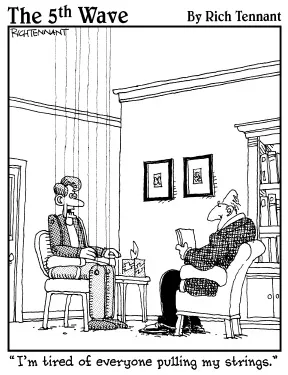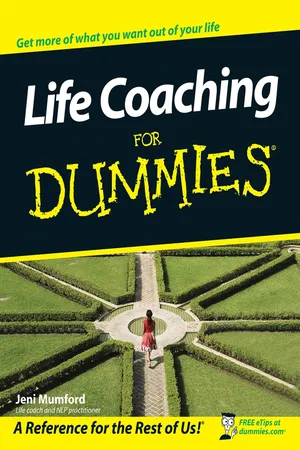Chapter 1
Introducing Life Coaching
In This Chapter
Knowing why coaching works
Meeting your inner coach
Coming to terms with change
Working out your current life priorities
People talk lots of hokum about life coaching. Life coaching television programmes, magazines, and newspaper columns range in quality from the powerful and inspirational through to the downright misleading and dangerous. True life coaching isn’t about some guru telling you how you should live. Yes, you may be tempted to bask in the comfort of an ‘expert’ who can fix your life, your fashion sense, your body flaws, and your emotional angst. But these fixes are too often like an elegant sticking plaster. Changes don’t last, unless a real change has come from deep within you. True life coaching enables you to call on your very own inner guru, any time, any place, with or without the support of another human being.
This chapter explains how coaching can work its magic for you and how it can help you manage the changes in your life, not just right now, but through all of the shifting priorities of your journey.
A Brief Definition of Life Coaching
Here’s my definition of life coaching:
A purposeful conversation that inspires you to create the life you want.
You have conversations all the time (unless you’re a hermit in a cave). Your conversations are either chit-chat to pass the time and get along with people, or purposeful talks where you clarify thought processes, resolve problems, reach agreements, and commit to actions.
Life coaching uses dialogue as well to move you along in the right direction. When you engage in a purposeful conversation with your coach – who is either a skilled professional, or simply that part of you that already is your coach – you cut through all the chit-chat and get to the root of everything. You may discuss the following topics, for example:
Why you act in the way that you do.
Which beliefs about yourself stop you from taking certain actions.
What your options really are.
How you can best go about getting the right results for you.
How you can maintain your motivation.
Coaching conversations leave you refreshed, inspired, and ready for action.
Life coaching can help you form the questions that lead to answers that are right for you, which is a lot better than taking someone else’s answers. Many books claim that they can guide you to The Magic Formula for Happiness, Success, and Fulfilment in life, but this book is a little different. Here, I guide you to the source of your own magic formula. The answers aren’t ‘out there’ – you already have them all and life coaching shows you how and where to find them.
What Life Coaching Is Not
In its purest form, life coaching is a technique that uses powerful questions to facilitate you in finding your own answers. It does, however, draw on, and can work alongside, many other similar approaches. This section explores the distinctions between coaching and its close relations.
Here are some of the things that life coaching is not:
Coaching is not counselling or therapy. Counselling and therapy typically start from the perspective that something needs fixing. While many therapies are firmly rooted in present action and forward motion, their focus is more towards understanding what went wrong and achieving acceptance with that in order to move forward. With coaching, the bias is towards working from the perspective that you are fundamentally whole, healthy, and strong enough to deal with the challenges of coaching.
Coaching is not mentoring. Working with a mentor is a great way of developing yourself. You find someone who is further ahead on the road than you are in some important respect – skills, knowledge, awareness – and model yourself on the best that you see in them. A mentor freely passes on wisdom and you then choose whether or not to accept it. A mentor may also coach you to draw on your own inner resources – but the function of mentoring tends to focus on building your capability in an informal way.
One of the outcomes you may get from self-coaching is that you decide to find yourself a mentor to model. This may be someone you work with who can pass on their wisdom in a very specific work context. Or it could be a person who you respect for their overall attitude to life – maybe someone who excels at building strong positive relationships, or who always exudes an air of calm and balance. You can actively work with a mentor or simply observe a strong role model rising to life’s challenges so you can adapt your own style to theirs.
Coaching is not giving advice. A coach does not give you advice. A coach may discuss and suggest options for you, but essentially coaching facilitates your own thought processes. In this book I offer you practical principles, which acts like coaching to prompt you to let the voice of your own inner coach speak out. When you coach yourself, listen to your inner coach but don’t lecture yourself.
A nondirective coach is someone who steers away from intervening, mentoring, and giving advice. When you coach yourself, always give yourself the space to work things out calmly and objectively, based on what you really want and need.
See Chapter 2 for more guidance on choosing the right professional coach for you, which is a great way to experience how non-directive coaching works before trying it out for yourself.
Living Your Ideal Life
John Lennon wrote, ‘Life is what happens when you are making other plans.’ I bet you often feel that you’re so busy doing all the things you have to do that you never get a chance to enjoy the fruits of your labours – or simply ‘be’.
Your happiness in life hinges on maintaining a delicate balance:
Doing the tasks and filling the roles you have to fulfil each day. These tasks are things that maintain you and keep your life running smoothly, such as your job, shopping, mowing the lawn, and loading the dishwasher. The ‘doing’ category also includes the big things you do and achieve, such as running a marathon or honing a skill.
Having the things you enjoy in your life. These ‘things’ may be material possessions, such as a house, a fancy car, or a pair of designer shoes. Or they can be intangibles like security, peace of mind, and love.
Being content and enjoying your experiences from all that you do and have. ‘Being’ means having a sense of who you are – a feeling of being comfortable in your own skin. You often sense that you are ‘simply being’ in those quiet (and maybe rare) moments with yourself when you feel that you are the right person, in the right place, at just the right time.
When these three aspects of your life are in tune with each other, your life feels just right.
Life coaching doesn’t turn your life into a super-charged roller-coaster of an experience – unless that’s what you really want. It does help you to work out your unique gifts and your true priorities and it does support you in eliminating anything blocking you from doing, having, and being what you want. And life coaching provides that sprinkling of magic action dust that can transform your current life into something even better than your wildest dreams, because those dreams are rooted in your ideal reality.
Getting ready for change
Perhaps you picked this book off the shelf because you’re totally fed up with where you are in your life. Or you may have a nagging feeling that more potential for happiness and fulfilment is out there for you. Obviously you’re ready for change – after all, you don’t want your life to stay exactly the same, so that means change, right?
Maybe. Think carefully. The results you get from coaching depend to a large part on where you are in terms of readiness and willingness to change, and although you may feel that you want to change, you may not be quite ready to do so.
Most New Year’s resolutions fail because the goals you set aren’t always linked into your state of readiness. Unless you’ve done the work to seriously consider your options, and prepared the ground for action, your laudable resolution to lose 20 pounds, or give up smoking, or find the man/woman of your dreams is likely to lose momentum well before the end of January. If that’s the case, nothing is wrong with you, you just haven’t geared yourself up to sustain your promise to yourself.
Here are the stages you need to work through for any change to be effective:
1. Drag yourself out of the Bogs of Denial. If you bought this book you’re probably not in denial about an aspect of your life that you want to change. Through coaching you may find that you’re stubbornly resisting change in another aspect of your life. Denial is a tough phase, not least because its existence is hard to recognise in yours...






